北师大英语必修五教案:Unit13PeopleLesson4FirstImpressions
Unit 13 People Lesson 4 First Impressions 教学设计2-优质公开课-北师大必修5精品

Unit 13 PeopleLesson 4 First Impressions 教学设计ⅠTeaching objectives1.Knowledge objectives: to build up an area of vocabulary associated with people and learnsome useful expressions to describe first impression.2.Ability objectives: to practise talking and writing about one’s experience of meeting someonefor the first time.3.Moral objectives: we should behave ourselves to leave others a good impression, but notjudge a person only from their first impression.ⅡTeaching important points:1.To learn and master the new words related to first impression.2.To enable students to understand the text better.ⅢTeaching difficulties:1.How to make students to understand the long article in the shortest time.2.How to encourage students to talk about their own experience in English.ⅣTeaching type: a reading lessonⅤTeaching methods:1. Task-based teaching method;2. Question-and-answer activity method3. Individual, pair, or group work to make students involved in the classⅥTeaching aids: the multimedia computer; Blackboard; chalk.ⅦTeaching procedures:Step 1 Lead in1.Show four pictures on the blackboard and make students to tell me their impression of thesepeople.2.Ask students to discuss some questions on the screen and introduce the topic of this lesson☆Watch a video and find outWhat is the man’s impression of the old woman at the first sight?What can we learn from the story?Step 2 V ocabulary review and pre-reading1.Review and learn the meaning of the key words which will appear in the text2.Match these words with their English meaning on the computerStep 3 Fast-reading1.Skim the whole passage and try to do the T/F.2.If the statement is wrong, ask them to correct it by finding evidence in the textStep 4 Detailed-reading1.Present questions on the screen and ask students to read the text again and answer thequestions individually.2.After they finish the question, remind them to check answers with deskmates3.Check the answers one by one in the class.Step 5 Post-reading (speaking and writing)1. Encourage students to make notes about the first time you met someoneWho/when/where you metWhat he/she was doingWhat he/she said or didWhat he/she seemed like2.Students work individually and then exchange their ideas with group members.Post-Reading☆Complete the paragraph below with the correct form of the following words.glance, annoy, recognize, concentrate, disturb,resist, whisper, glare, inconsiderate, gratefulJanet was 1) on writing an essay when a noise 2) her. She 3)Her brother’s whistling. “Shh” she 4),5) at him quickly. The noise didn’t stop. Janet 6) the urge to scream and instead 7) at him angrily. “Please stop it, Simon. You are being very 8) ,” she said. But still he didn’t stop. Janet was now very 9).Just then her father called Simon out of the room. Janet smiled, feeling 10) to her dad. Answers:1concentrating 2 disturbed 3 recognised 4whispered 5glancing 6resisted 7glared 8inconsiderate 9annoyed 10gratefulStep six HomeworkWrite a passage about your experience of meeting sb that you didn’t like at first but later you became good friends.。
最新北师大版高中英语必修五-Unit-13-People--Lesson--4--First-Impression-教案

Unit 13 People Lesson 4 First ImpressionTeaching aims:☆Students are able to analyze the six factors and basic structures of a story.☆Students are able to finish the practices with the reading strategies.☆Students are able to use different expressions to describe the feelings in the first impression. Teaching important and difficult points:☆To find out the six factors and basic structure of the story.☆To finish the summary of the text.Teaching aids:☆Pictures about first impression, blackboard, ect.Teaching procedures:Step ⅠPre-reading1. Teacher asks students to talk about their first impressions of their classmates and then show a picture to tell that the first impression may be not right.2. Teacher asks students to review the six factors in a story and learn the basic structure of a story. Step ⅡWhile-reading☆Task 1 scanStudents match the main ideas with paragraphs to practice reading strategy--scan.☆Task 2 detailed readingPart 1 : Practice 1 students fill in the table by finding out the key factors;Practice 2 students answer the questions to get the detailed information;Practice 3 students fill in the blanks to learn the feelings in different stages before climax1.Part 2: Practice 1 students fill in the table by finding out the key factors;Practice 2 students fill in the blanks to learn the feelings in different stages before climax2. Step ⅢPost-reading☆Task summaryStudents use the right words to finish the summary of the story.Step ⅣAssignmentFinish the exercises in p60 in the textbook.。
广东省佛山市高明区第一中学北师大版必修五英语学案:Unit 13 People Lesson 4 First Impressions 第1课时

Unit 13 People Lesson 4 First Impressions 第1课时【教学目标】I. Learning Objectives知识目标。
1.To review some descriptions related to people’s emotions:复习与人的情感有关的形容词。
2. To be able to recognize the new vocabulary. 学习新单词【学习过程】(一)温故知新语境填词1.S________were put up for survivors whose homes had been destroyed in the earthquake.2.It is my f________that I forgot to tell you the news.3.All the young soldiers are ready to________ (流血) for the country.4.Many women chose to be__________ (家庭主妇)after marriage.5.It was a________ (宽慰) to be able to talk to someone about it.Ⅱ.用所给词的适当形式填空1.Have you heard anything about the two________(miss) students?2.I saw she had tears________(run) down her cheeks at lunch today.3.I hope they have warm jackets________(make) of wool.4.They might have some food________(leave) from camping but they may not have any water.5.One of them might be bleeding or have a________(break) arm or leg.(二)课前预习。
【公开课教案】北师大必修五Unit 13 People Lesson 4 First Impressions
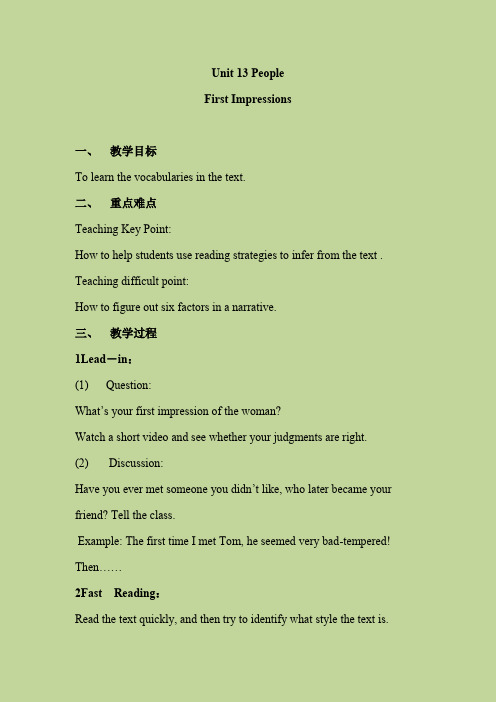
Unit 13 PeopleFirst Impressions一、教学目标To learn the vocabularies in the text.二、重点难点Teaching Key Point:How to help students use reading strategies to infer from the text . Teaching difficult point:How to figure out six factors in a narrative.三、教学过程1Lead-in:(1) Question:What’s your first impression of the woman?Watch a short video and see whether your judgments are right. (2) Discussion:Have you ever met someone you didn’t like, who later became your friend? Tell the class.Example: The first time I met Tom, he seemed very bad-tempered! Then……2Fast Reading:Read the text quickly, and then try to identify what style the text is.A. Narrative(记叙文)B. Exposition (说明文)C. Practical writing (应用文)D. Argumentation (议论文)3Careful Reading:Find the six factors in this story.When (time):______________________________________________ Where (place): ______________________________________________ Who (character):_____________________________________________ Why (cause):________________________________________________ Process (course):_____________________________________________ How (outcome):_____________________________________________ 4Inference Reading:(Part1) Questions:Do Jane’s impressions of Jenny stay the same from beginning to end?If not, how do the impressions change?2.What kind of person do you think Jenny is?___A.Very selfish.B.Very kind, friendly and helpful.C.Very generous.D.Very humorous.(Part2) True or false:Use the reading strategies; underline the important words in the sentencesbelow and decide whether they are true or false.1. Jane was pleased when Jenny started singing.2. Tennyson must be a famous poet.3. Jane first saw Jenny near the “English Literature” section.4. Jane was upset that she had left her book in the library.5. Jane didn’t feel that it was necessary to apologize.5Post-reading:DiscussionWhat are your first impressions of your deskmate or friend?Where and when you met?What he/she was doing?What he/she said or did?What he/she seemed like?You can use these words:classroom, school gate, at the first day of September, walking, talking with others, pretty, handsome, cute, serious, selfish, cheerful, shy, brave, kind, difficult, helpful, outgoing, active, careful, independent, dependent, clever, stupid, funny, ------四、课堂小结During this class we have learnt many words to describe different persons and also we know how to describe the first impression.。
北师大版高中英语必修5Unit13教案4 First Impressions教学设计

4 First ImpressionsObjectives■ To practise reading for inference.■ To practise making opposites of adjectives using a prefix.■ To practise talking and writing about one’s experience of meeting someone for the first time.Possible problemSome students may have difficulty “reading between the lines” if they find too many unknown words in a text.BackgroundAlfred Tennyson (1809-1892) an English Poet who was made Poet Laureate, and whose works include The Change of the Light Brigrad.Quote: Wilson Mizner (1876-1933) was a successful US businessman.Routes through the materialIf you are short of time, set Exercise 5 and 8 for homework.If you have time, do the Options.If you have two periods for this lesson, a suitable natural break is after Exercise 5. ReadingBefore you startExercise 1■ Read the example sentence with the class. Elicit suggestions for how this story could continue.■ Students then work in pairs sharing experiences they have had.■ Ask students if the opposite has ever happened to them, i.e. they met someone they liked and later didn’t like. Get them to tell such stories to each other. Ask them which situation happens most often.Read to learnExercise 2■ Have students read through the questions before reading the text.■ Students read the text silently and find answers to the questions.■ When checking students’ answers, ask them to read out the section of text which gives the answer. When giving answers to question 5, encourage students to support their point of view by referring back to the text.Answers1 in the local library2 poetry3 an important science exam4 She heard someone humming behind her5 (suggested answer) friendly, warm-hearted, forgiving6 She asked a librarian and got it from the library files.7 (open question)■ In pairs, students do question and answer exercise.Exercise 3■ Read the strategies with the class.■ Look at the example item with the class.■ Students work in pairs underlining the important words in the sentences.■ Check answers to this stage of the exercise before moving on.Answers2 poet3 near the poetry section4 upset5 didn’t feel … necessary■ Students then find the relevant parts of the text and decide if the statements are true or false.■ When checking answers, have students correct the false statements.Answers1 F2 T3 T4 T5 FExercise 4■ Students work individually replacing the underlined phrases with words from the text.■ Check answers by having students read out the sentences.Answers1 glared at2 annoyed / concentrate3 recognise4 so inconsiderate5 was grateful6 resist7 disturbing8 whispered 9 glanced 10 frowned angrilyExercise 5■ Read the given words with the class.■ Students complete the paragraph individually. Ask them to pay attention to the proper use of the form.■ Check answers as a class by having students read out the paragraph.Answers1 concentrating2 disturbed3 recognised4 whispered5 glancing6 resisted7 glared8 inconsiderate9 annoyed 10 grateful■ If time permits, get students to work in pairs and think of their own similar experience as the girl. Write down the notes and tell their own story of the first impression.■ If there is no time left, leave it as homework.。
Unit13Lesson4Firstimpression 教案-北师大版高中英语必修五

Unit 13 Lesson 4 First Impressions(Reading) 教案I. Teaching Aims:By the end of this lesson, the students should be able to:1.Analyze the six factors and basic structures of a story.2. Find out words which described the changes of the feeling of the author3.Finish relevant reading exercises with proper reading strategies.II. Teaching Important and Difficult pointsTo practice using different reading strategies for different tasks.III. Teaching Methods:1.Raising question approach2.Task-based approach3.DiscussionV. Teaching Steps:Step 1 Lead-inTalk with students through the following question:If you are reading books in the library, someone is keeping disturbing you. What is your attitude to her?Step 2 While-reading1.Fast- reading1)Skimming: Identify the style of the text.★A. Narrative (记叙文) B. Exposition(说明文)C. Practical writing (应用文)D. Argumentation(议论文)2)Scanning: Find the six factors in the storyWhen (time): the day that I met my best friend for the first timeWhere (place): in the local libraryWho (character):Jane& JennyWhy (cause):Jenny annoyed Jane in the libraryWhat (course):Jenny returned the textbook to Jane and forgave Jane’s rudewords.How (outcome):They became good friends.2.Careful-reading1)Read the text again carefully, and work in pairs to fill in the table according tothe text.(keys: 1. revision 2. disturbed 3. singing 4. sensitive 5. selfish 6. glaring 7. leaving8. upset 9. relief 10. grateful 11. apologized 13. forgave)2) Find out the changes of Jane’s feelingsHow did Jane’s feeling change?I was getting more and more annoyed......it made me even angrier...I was so upset that I almost cried.I sighed with relief...I was so grateful...I was filled with shame and I apologized several times.I felt so guiltyI often think how lucky I amStep 3 Post-readingThrough this lesson, what have we learned? Let us think about it. Who know? From today’s lesson, we find that it’s wrong to judge people by your first impressions on them. Great! We should respect each other, understand each other. Well done! We should control our temper when we angry. Good job! Thank you all!Step4 Homework1.Read through the whole text for better understanding.2.Finish the exercise 5 on p15.。
Unit 13 People Lesson 4 First Impressions 教学设计3-优质公开课-北师大必修5精品
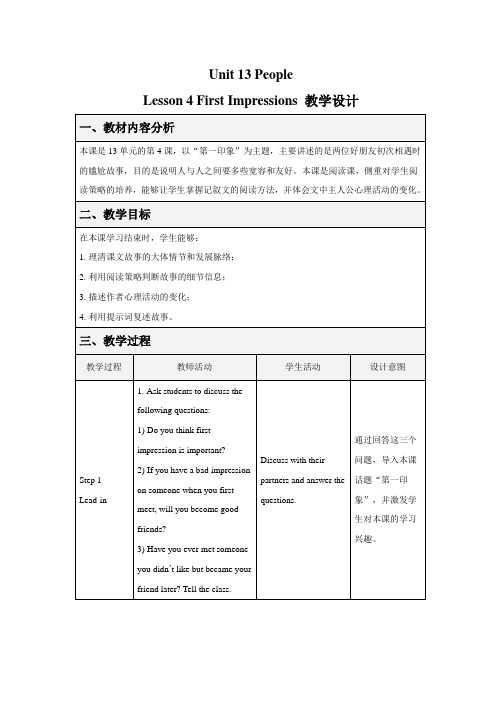
通过回答这三个问题,导入本课话题“第一印象”,并激发学生对本课的学习兴趣。
Step 2
Fast reading
1) Ask students to skim the passage and try to identify the style of the text.
通过复述故事巩固所学内容。
四、板书设计
Lesson 4 First Impressions
Feelings Impressions
Beginning anxious, annoyed,
angry Selfish
Turning point upset, grateful, kind & helpful
3) Ask students to match each part with its main ideas.
Students read the story quickly and get style, general idea and structure of the text.
通过快速阅读,识别文章的文体,了解故事的情节以及故事的结构。
Unit 13 People
Lesson 4 First Impressions教学设计
一、教材内容分析
本课是13单元的第4课,以“第一印象”为主题,主要讲述的是两位好朋友初次相遇时的尴尬故事,目的是说明人与人之间要多些宽容和友好。本课是阅读课,侧重对学生阅读策略的培养,能够让学生掌握记叙文的阅读方法,并体会文中主人公心理活动的变化。
1) Do you think first impression is important?
2017-2018学年高中英语 Unit 13 People 13.4 Lesson 4 First lmpressions讲义 北师大版必修5

there
glaring at one another/each other
.
他们并未打架,只站在那里怒目相视。
4)I found myself
staring at
her as if she were my dear
mother.
我发现自己瞪大眼睛看着她,好像她是我亲爱的妈妈。
答案:D
一二三四
5.From the passage we know
.
A.the first impression is not always reliable
B.the first impression is important
C.it is important to give others a good first impression
一二三四
三、阅读课文First Impressions,选择正确答案
1.Why was the writer full of anxiety that day?
A.Because she wanted to meet her best friend.
B.Because there was an important oral exam coming near.
1234
3.I glanced at the book’s cover. 我瞥了一眼书的封面。 考点glance vi. 瞥一眼 glance at 匆匆一瞥 【高考典句】(2015·湖南高考)He must have sensed that I was looking at him.He suddenly glanced at me and said quietly,“Why are you staring at me like that?” 他肯定意识到我正在看着他。他突然看了我一眼,悄悄地说:“你为 什么那样盯着我?” She glanced around/round the room to see if there was anyone she knew. 她环视了一下房间,看看是否有认识的人。
北师大版高中英语必修五Unit 13 People Lesson 4 First Impression 课件(10张)
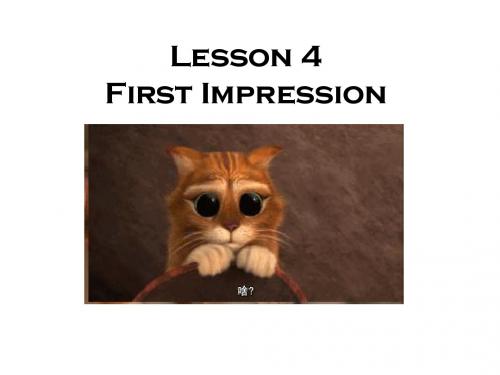
Paragraph 4-7 Who Where When What Why How
Practice 1 fill in the table
Jane (the author ) &Jenny p5:At home; p6:At a convenience store When I got home two hours later I left my textbook; Jane phoned me and brought it to me I was in a hurry. Jane was a nice girl. She got my name in the book and asked a librarian to get my phone number.
…it made me even _______... angrier
glared I turned around and _______ at the person…
annoyed I was getting more and more _______...
beginning
revision
In the library
Lesson 4 First Impression
Six Factors in a Story
Who Where When What Why How
Basic structure of a story: beginning climax development
ending
Task1 Scan. Match the main idea with paragraphs:
Practice3 fill in the blanks Jane’s feeling and reactions ending climax2
高中英语Unit13 people 知识精讲北师大版必修5 教案
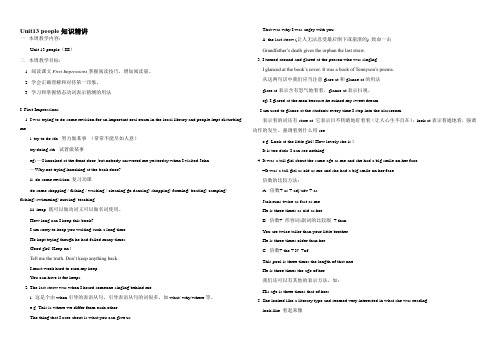
Unit13 people知识精讲一. 本周教学内容:Unit 13 people(III)二. 本周教学目标:1. 阅读课文First Impressions,掌握阅读技巧,增加阅读量。
2. 学会正确理解和对待第一印象。
3. 学习和掌握情态动词表示猜测的用法.I. First Impressions1. I was trying to do some revision for an important oral exam in the local library and people kept disturbing me.i. try to do sth. 努力做某事(常常不能尽如人意)try doing sth. 试着做某事eg: —I knocked at the front door ,but nobody answered me yesterday when I visited John.—Why not trying knocking at the back door?ii. do some revision 复习功课do some shopping / fishing / washing / cleaning go dancing/ shopping/ farming/ boating/ camping/ fishing/ swimming/ nursing/ teachingiii. keep 既可以做动词又可以做名词使用。
How long can I keep this book?I am sorry to keep you waiting such a long time.He kept trying though he had failed many times.Good girl! Keep on !Tell me the truth. Don’t keep anything back.I must work hard to earn my keep.You can have it for keeps.2. The last straw was when I heard someone singing behind me.i. 这是个由when引导的表语从句。
Unit 13 people Period Four Lesson 4 First Impressions课件 北师大版必修5课件

课前自主学习
课堂互动探究
Ⅲ.句型搜索
1.The first time I met Tom,he seemed to be allergic to ev erything.
[ 信息提取 ]the first time +从句,译为“第一次做……时
候”,the first time 充当了连词。 [例句仿写]我第一次见到他时,就爱上他了。 _______________________________________________ ,I f The first time I saw him ell in love with him.
课前自主学习
课堂互动探究
2.The fact that she looked like a sensitive friendly girl did n’t matter.
[信息提取]句中that引导了一个同位语从句。
[例句仿写]信息传来了说他会晚到的。 Word came that __________________________________he would come late.
ber and could bring the textbook for me.
课前自主学习 课堂互动探究
5 ______We met at a convenience store and I apologized to he r for my rude behaviour in the library.
课前自主学习
课堂互动探究
(2)What was Jane’s last straw?
A.More and more people were in the library. B.Jenny was also in the lቤተ መጻሕፍቲ ባይዱbrary.
【免费】高中英语必修5Unit13-Lesson4教学设计-北师版
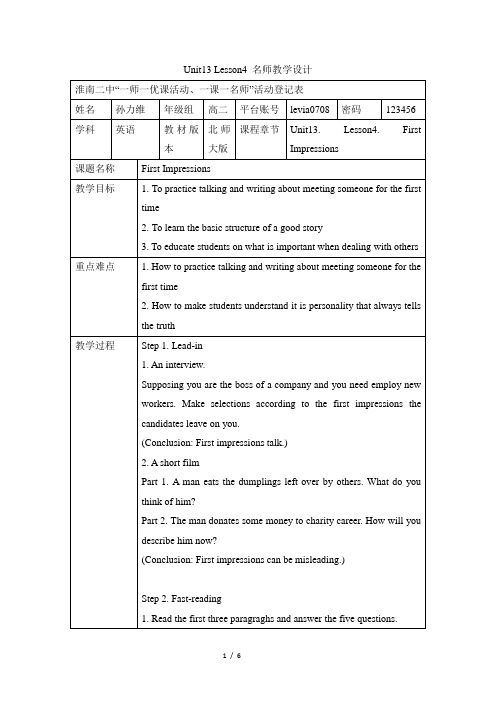
Unit13 Lesson4 名师教学设计Unit 13. Lesson 4. First impressions淮南二中孙力维Analysis of the teaching material:This is the 4th lesson of Unit 13. Its topic is “first impressions”. The passage tells of an embarrassing incident happening when two friends met for the first time. This story is meant to convey a message that people need more tolerance and kindness from each other. The difficult point of this lesson is the description of personality and psychological changes.This period of the lesson puts more stress on the understanding of the text and the emotional identification, and guiding the students to clearly see the development of the story and extract the detailed information. Meanwhile, it also aims to help students to get familiar with the language used to describe personality and psychological changes, which will get the students well prepared for the language output.Teaching objectives:4.To practice talking about meeting someone for the first time.5.To learn the basic structure of a good story.6. To educate students on what is important when dealing with others.Teaching important and difficult points:3. How to practice talking about meeting someone for the first time.4. How to make students understand it is personality that always tells the truth. Teaching procedure:。
高中英语 Unit 13《People》Lesson 4 First Impressions教案 北师大版必修5
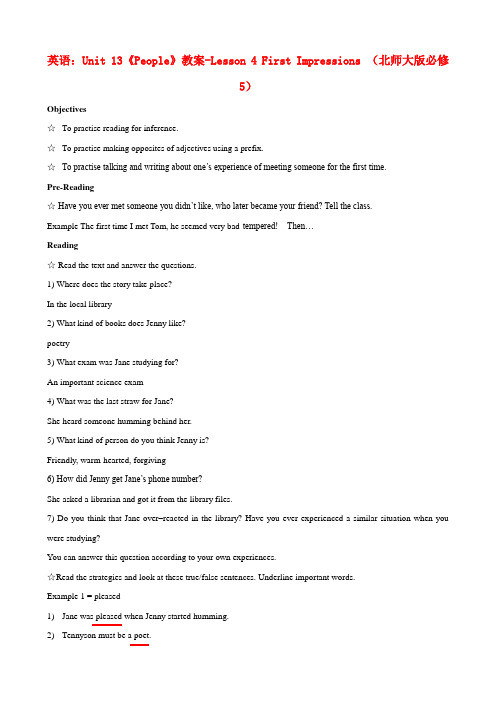
英语:Unit 13《People》教案-Lesson 4 First Impressions (北师大版必修5)Objectives☆To practise reading for inference.☆To practise making opposites of adjectives using a prefix.☆To practise talking and writing about one’s experience of meeting someone for the first time.Pre-Reading☆Have you ever met someone you didn’t like, who later became your friend? Tell the class.Example The first time I met Tom, he seemed very bad-tempered! Then…Reading☆ Read the text and answer the questions.1) Where does the story take place?In the local library2) What kind of books does Jenny like?poetry3) What exam was Jane studying for?An important science exam4) What was the last straw for Jane?She heard someone humming behind her.5) What kind of person do you think Jenny is?Friendly, warm-hearted, forgiving6) How did Jenny get Jane’s phone number?She asked a librarian and got it from the library files.7) Do you think that Jane over–reacted in the library? Have you ever experienced a similar situation when you were studying?You can answer this question according to your own experiences.☆Read the strategies and look at these true/false sentences. Underline important words.Example 1 = pleased1)Jane was pleased when Jenny started humming.2)Tennyson must be a poet.3)Jane first saw Jenny near the poetry section.4)Jane was upset that she had left her book in the library.5)Jane didn’t feel that it was necessary to apologise.Answers: FTTTFPost-Reading☆Complete the paragraph below with the correct form of the following words.glance, annoy, recognize, concentrate, disturb,resist, whisper, glare, inconsiderate, gratefulJanet was 1) on writing an essay when a noise 2) her. She 3)Her brother’s whistling. “Shh” she 4),5) at him quickly. The noise didn’t stop.Janet 6)the urge to scream and instead 7) at him angrily. “Please stop it, Simon. You are being very 8) ,” she said. But still he didn’t stop. Janet was now very 9) .Just then her father called Simon out of the room. Janet smiled, feeling 10) to her dad.Answers: 1concentrating 2disturbed 3recognised 4whispered 5glancing 6resisted 7glared 8inconsiderate 9annoyed 10grateful☆V ocabulary: opposites●You can often make opposites of adjectives using a prefix.Example able/unable, pleased/displeased, considerate/inconsiderateUse prefixes to make opposites of the underlined words.Peter is very organized and reliable. He is also sociable, sensitive and tolerant. He seems interested in or aware of other people’s feelings and is often kind. When you ask him for something, he is always sympathetic and helpful.I think he must be very satisfied with his life.Answers: unreliable, intolerant, unaware, unkind, unsympathetic, unhelpful, dissatisfied●Sometimes adjectives have a direct opposite.Example old/young, short/tall●Think of opposites for these adjectives:Bad-tempered, generous, hard-working, nervous, shy, strongAnswers: good-tempered, mean, lazy, confident, out-going, weak●Now use adjecti ves to write five sentences about yourself and people you know.Example I am sometimes disorganized, but usually I am reliable.Writing and speaking☆ Make notes about the first time you met someone.Who/when/where you metXiaoming (my new neighbour), last month, in the streetWhat he/she was doinggoing into his house with his bikewhat he/she said or didasked about my family/showed me his catwhat he/she seemed likecheerful, a bit shyLanguage points:1.The day that I met my best friend for the first time I was in a terrible mood.第一次遇到我最好的朋友那天,我情绪很坏。
北师大版高中英语必修5教案:Unit13PeopleWord版含解析
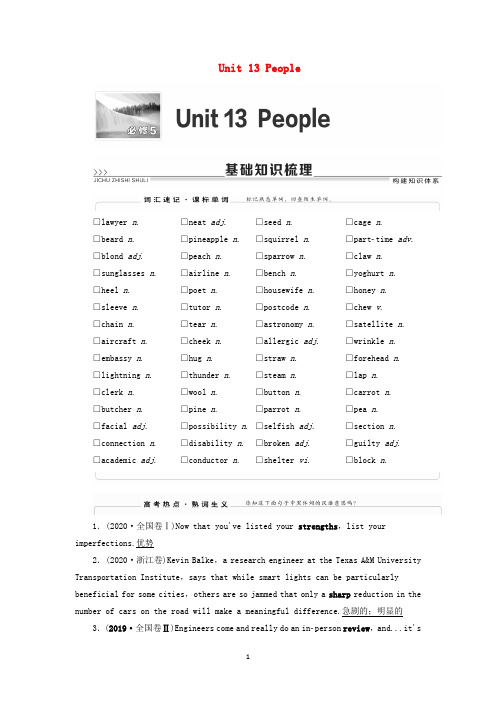
Unit 13 People□lawyer n. □neat adj. □seed n. □cage n.□beard n. □pineapple n. □squirre l n. □parttime adv.□blond adj. □peach n. □sparrow n. □claw n.□sun glasses n. □airline n. □bench n. □yoghurt n.□heel n. □poet n. □housewife n. □honey n.□sleeve n. □tutor n. □postcode n. □chew v.□chain n. □tear n. □astronomy n. □satellit e n.□aircraft n. □cheek n. □allergic adj. □wrinkle n.□embassy n. □hug n. □straw n. □forehead n.□lightning n. □thunder n. □steam n. □lap n.□clerk n. □wool n. □button n. □carrot n.□butcher n. □pine n. □parrot n. □pea n.□facial adj. □pos sibility n. □selfish adj. □section n.□connection n. □disability n. □broken adj. □guilty adj.□academic adj. □conductor n. □shelter vi. □block n.1.(2020·全国卷Ⅰ)Now that you've listed your strengths,list your imperfections.优势2.(2020·浙江卷)Kevin Balke,a research engineer at the Texas A&M University Transportation Institute,says that while smart lights can be particularly beneficial for some cities,others are so jammed that only a sharp reduction in the number of cars on the road will make a meaningful difference.急剧的;明显的3.(2019·全国卷Ⅱ)Engineers come and really do an inperson review,and...it'snot a very nice thing at times.It's a hard business review of your product.审查,评审[单词拼写·运用]核心单词语境运用1.pray vt.& vi.祈祷,祷告 2.deserve vt.应得,值得3.accuse vt.控告,谴责 4.desire n.渴望,欲望5.assistant n.助手,助理 6.confirm v.证实7.salty adj.含盐的,咸的8.shortcoming n.缺点,短处9.concentrate vi.集中(思想、注意力等) 10.positive adj.积极的11.senior adj.高级的12.uniform n.制服13.emergency n.紧急情况14.gifted adj.有天赋的15.description n.描述,形容16.failure n.失败17.mistaken adj.错误的18.athletic adj.喜爱运动的19.characteristic n.特点,特性20.satisfaction n.满意,满足21.biology n.生物学22.aboard prep.在(上)船(飞机、火车、公共汽车)上23.independence n.独立24.upset adj.不安的,不快的25.fault n.错误;缺点26.relief n.减轻,宽慰27.anxiety n.忧虑,担心用所给词的适当形式填空。
高中英语北师大版必修5 Unit13 People《Lesson4 First Impressions》优质课教案省级比赛获奖教案公开课教案
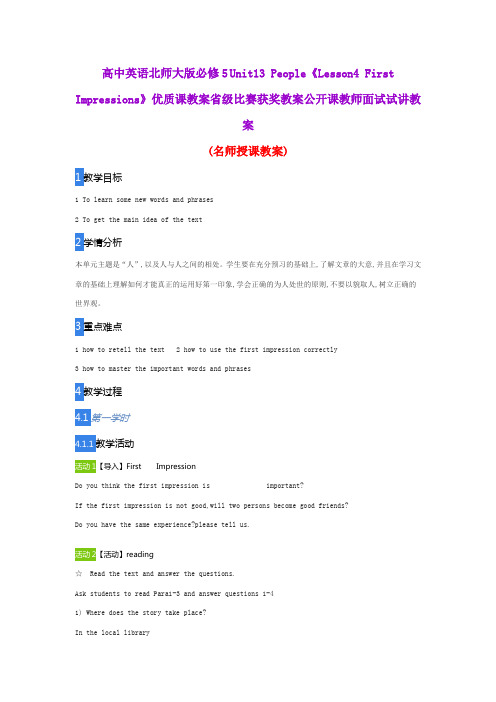
高中英语北师大版必修5Unit13 People《Lesson4 First Impressions》优质课教案省级比赛获奖教案公开课教师面试试讲教案(名师授课教案)1教学目标1 To learn some new words and phrases2 To get the main idea of the text2学情分析本单元主题是“人”,以及人与人之间的相处。
学生要在充分预习的基础上,了解文章的大意,并且在学习文章的基础上理解如何才能真正的运用好第一印象,学会正确的为人处世的原则,不要以貌取人,树立正确的世界观。
3重点难点1 how to retell the text2 how to use the first impression correctly3 how to master the important words and phrases4教学过程4.1第一学时教学活动1【导入】First ImpressionDo you think the first impression is important?If the first impression is not good,will two persons become good friends?Do you have the same experience?please tell us.2【活动】reading☆Read the text and answer the questions.Ask students to read Para1-3 and answer questions 1-41) Where does the story take place?In the local library。
高中英语Unit 13 Lesson 4教案 北师大版 必修5

高中英语Unit 13 Lesson 4教案北师大版必修51.look,seem与appear.look作“好象,看起来”讲,指从外表上看。
seem指从内心里的“判断”。
appear指给人以表面的印象。
.seem和appear后习惯接不定式to be;look后接to be常用于美国英语中,其意义相当于seem to be,都是“看起来”的意思。
.seem和look均可接as if引导的表语从句。
seem需要用it作形式主语,而look的主语可以是形式主语it,也可以是其他的人称代词。
appear则不能。
.seem和appear可用于“It seems/appears that…”的句型结构,而look则不能。
.seem和appear可用于以there为引导词的句型中,look则不能。
Eg: He looks like her father.He seems to be her father.She appears wise.It seems as if it were spring already.It looks as if we shall have to walk home.It seems that he had made some serious mistakes in his work.It appears that he was talking to himself.There seems (to be)no need to go.There appears to be only one room.2.The humming was so loud that I could even recognize the song!.so…that…意为“如此,以致”,在句中引导结果状语从句,结构中的so为副词,后面跟形容词或副词eg:I am so angry that I can’t say a word.It is so dark that I dare not go out alone..so…that与such…that…(1)so…that结构中的so为副词,后面跟形容词或副词;such…that中的such为形容词,后接名词;(2)当that前的名词有表示数量多少的many,much,few,little等修饰时,只能用so,不能用such(3)但若名词前的little意为“小(的)”时,则仍用,such,而不能用so(4)当that前是单数可数名词且该名词前有形容词修饰时,so+adj.+a/an 可转换为such+a/an+adj.+n.(5)当that前是不可数名词或复数可数名词时,则必须用sucheg: He became so angry that he couldn’t speak.他变得如此生气,以致说不出话来.It was such a fine day that we went out for a walk.那是一个如此晴朗的日子,所以我们出去散步.There was so much noise outside that we couldn’t hear the teacher.外面嘈杂声很大,以致我们不能听到老师的话.He had so many falls that he was black and blue all over.他跌了那么多的跤,以致全身青一块,紫一块的.It is such a little sheep that it can’t run fast.这只绵羊如此小,以致于它跑不快.She is so good a teacher that we all love her.=She is such a good teacher that we all love her她是一位好老师,我们都爱她.It was such fine weather that they all went shopping.那是个好天气,他们都去购物了.They are such nice bananas that we would like to eat them.它们是如此好的香蕉,以致我们都想吃它们.3.she was standing with a book in her hands near the poetry section..with a book in her hands 是with的复合结构.其结构是“with+宾语+宾补”,这一结构在句中常作定语或状语,作宾补的可以是介词短语,现在分词,过去分词,形容词,副词,动词不定式等,其基本结构如下:(1)with+n./pron.+介词短语(2)with+n./pron.+副词(3)with+n./pron.+不定式(4)with+n./pron.+现在分词(5)with+n./pron.+过去分词(6)with+n./pron.+形容词eg: He sat there with a smile on his face他微笑着坐在那里She saw a brook with red flowers and green grass on both sides.她看见一条两边是红花和绿草的小溪The street was quiet with no buses running.街上静悄悄的,没有汽车行驶In came a man with his hands tied back.进来一个人,手绑在背后She sat there with her head bent.她坐在那里,低着头He wore a shirt ,with the neck open, showing his bare chest.他穿着一个开领衬衣,露着胸膛Don’t sleep with the window open.不要开着窗睡觉。
- 1、下载文档前请自行甄别文档内容的完整性,平台不提供额外的编辑、内容补充、找答案等附加服务。
- 2、"仅部分预览"的文档,不可在线预览部分如存在完整性等问题,可反馈申请退款(可完整预览的文档不适用该条件!)。
- 3、如文档侵犯您的权益,请联系客服反馈,我们会尽快为您处理(人工客服工作时间:9:00-18:30)。
英语:Unit 13《People》教案-Lesson 4 First Impressions (北师大版必修5)Objectives☆To practise reading for inference.☆To practise making opposites of adjectives using a prefix.☆To practise talking and writing about one’s experience of meeting someone for the first time. Pre-Reading☆Have you ever met someone you didn’t like, who later became your friend? Tell the class. Example The first time I met Tom, he seemed very bad-tempered! Then…Reading☆ Read the text and answer the questions.1) Where does the story take place?In the local library2) What kind of books does Jenny like?poetry3) What exam was Jane studying for?An important science exam4) What was the last straw for Jane?She heard someone humming behind her.5) What kind of person do you think Jenny is?Friendly, warm-hearted, forgiving6) How did Jenny get Jane’s phone number?She asked a librarian and got it from the library files.7) Do you think that Jane over–reacted in the library? Have you ever experienced a similar situation when you were studying?You can answer this question according to your own experiences.☆Read the strategies and look at these true/false sentences. Underline important words. Example 1 = pleased1)Jane was pleased when Jenny started humming.2)Tennyson must be a poet.3)Jane first saw Jenny near the poetry section.4)Jane was upset that she had left her book in the library.5)Jane didn’t feel that it was necessary to apologise.Answers: FTTTFPost-Reading☆Complete the paragraph below with the correct form of the following words.glance, annoy, recognize, concentrate, disturb,resist, whisper, glare, inconsiderate, gratefulJanet was 1) on writing an essay when a noise 2) her. She 3)Her brother’s whistling. “Shh” she 4),5) at him quickly. The noise didn’t stop.Janet 6) the urge to scream and instead 7) at him angrily. “Please stop it, Simon. You are being very 8) ,” she said. But still he didn’t stop. Janet was now very 9).Just then her father called Simon out of the room. Janet smiled, feeling 10) to her dad.Answers: 1concentrating 2disturbed 3recognised 4whispered 5glancing 6resisted 7glared 8inconsiderate 9annoyed 10grateful☆Vocabulary: opposites●You can often make opposites of adjectives using a prefix.Example able/unable, pleased/displeased, considerate/inconsiderateUse prefixes to make opposites of the underlined words.Peter is very organized and reliable. He is also sociable, sensitive and tolerant. He seems interested in or aware of other people’s feelings and is often kind. When you ask him for something, he is always sympathetic and helpful. I think he must be very satisfied with his life. Answers: unreliable, intolerant, unaware, unkind, unsympathetic, unhelpful, dissatisfied●Sometimes adjectives have a direct opposite.Example old/young, short/tall●Think of opposites for these adjectives:Bad-tempered, generous, hard-working, nervous, shy, strongAnswers: good-tempered, mean, lazy, confident, out-going, weak●Now use adjecti ves to write five sentences about yourself and people you know.Example I am sometimes disorganized, but usually I am reliable.Writing and speaking☆ Make notes about the first time you met someone.Who/when/where you metXiaoming (my new neighbour), last month, in the streetWhat he/she was doinggoing into his house with his bikewhat he/she said or didasked about my family/showed me his catwhat he/she seemed likecheerful, a bit shyLanguage points:1.The day that I met my best friend for the first time I was in a terrible mood.第一次遇到我最好的朋友那天,我情绪很坏。
in a …mood 带着某种情绪。
如:Let’s discuss it in a calm mood.让咱们心平气和地讨论这件事。
I am in no mood for that. 我可没情绪。
2. I was getting more and more annoyed and of course, the more displeased I got, the less I was able to concentrate.我越来越烦躁,当然了,我越不高兴,就越难集中精力。
More and more 越来越…。
如:He became more and more interested in playing tennis. 他越来越喜欢打网球。
E-commerce has become more and more popular as people have discovered the advantages of online shopping.电子商务越来普及,因为人们发现了网上的购物的好处。
3. I turned around and glared at the person who was humming.我转身怒视着那个哼唱的人。
glare at 怒视。
如The fighting men were glaring at each other. 两个打斗的男人愤怒地对视着。
The angry father glared at his son. 愤怒的父亲瞪着儿子。
4.The fact that she looked like a sensitive, friendly girl didn’t wipe the frown off my face however, if anything, it made me even angrier.她看起来是个善解人意的友善的女孩,但这并没有拂平我紧皱的眉头,而是平添了我几分怒气。
句中that 所引导的是一个同位语从句。
紧跟在名词之后并说明该名词是指何人何物的词语称为同位语。
如:Mr Wang ,the father of one of my co-workers, is 94 years old and is still healthy.王先生,,我同事的父亲,今年94岁了还很健康。
